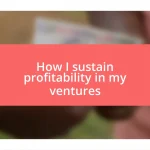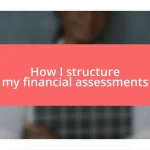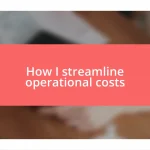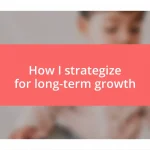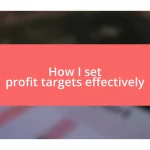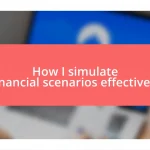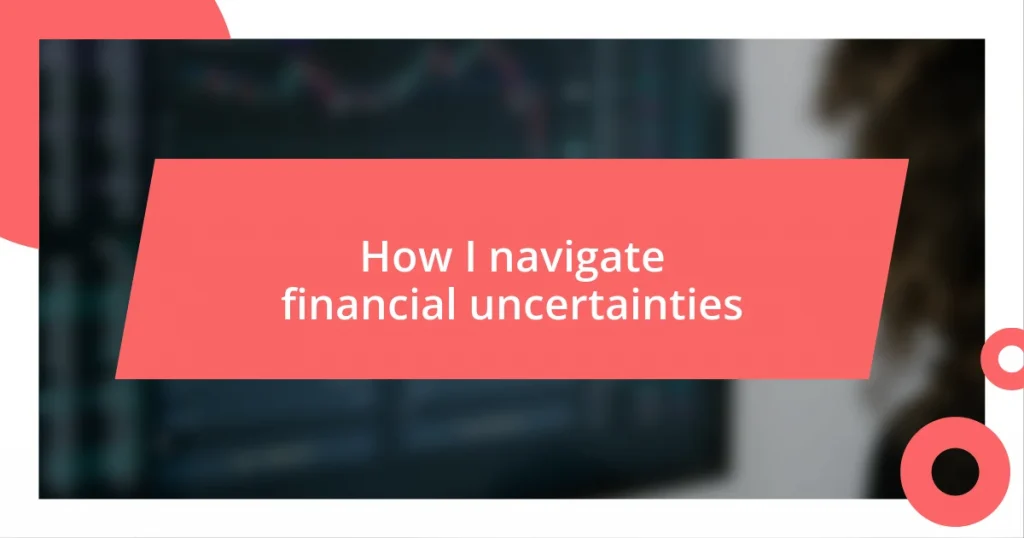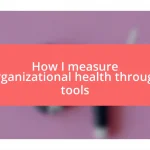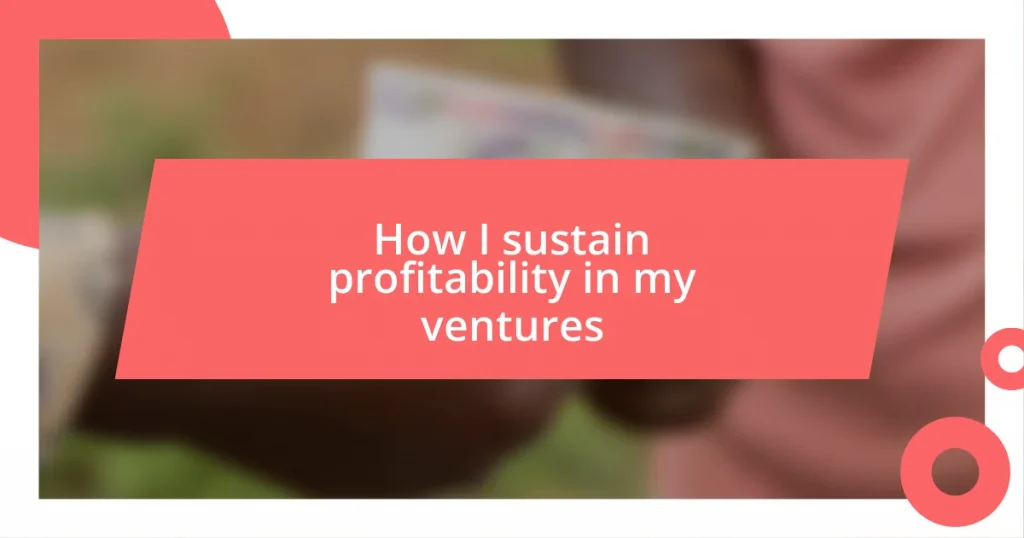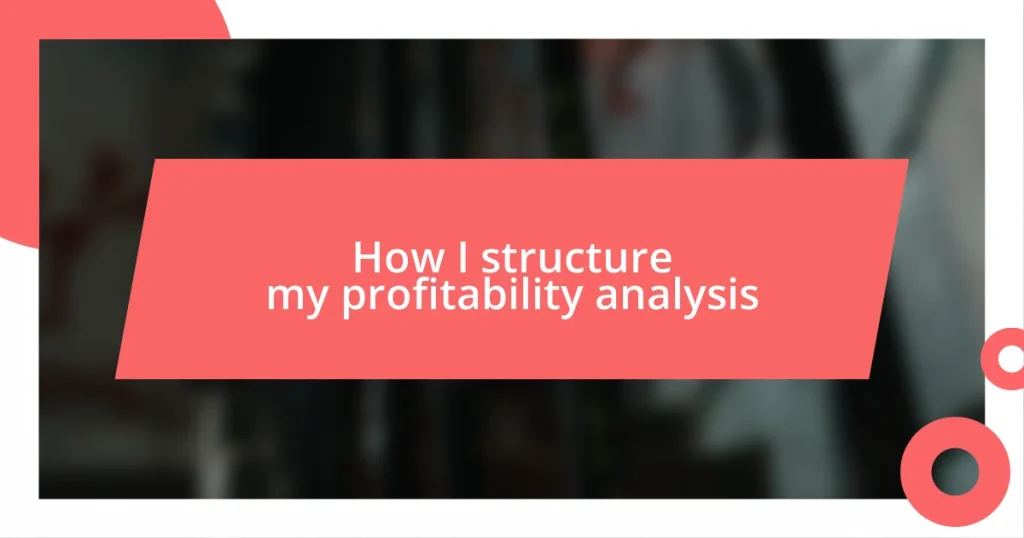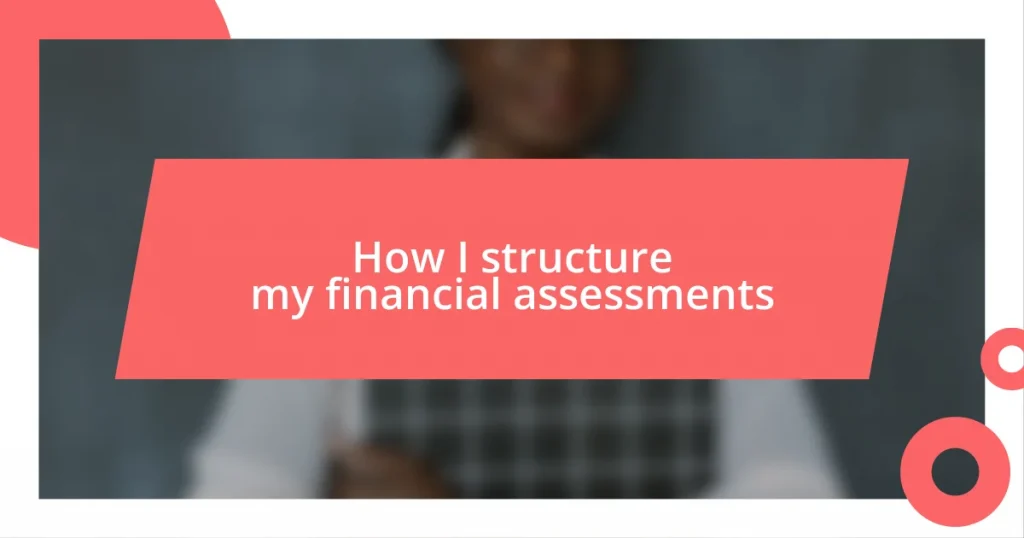Key takeaways:
- Creating a flexible budget enables adaptability to unexpected expenses, prioritizing needs over wants while maintaining financial goals.
- Building an emergency fund through regular savings provides a safety net for unexpected financial crises and reduces stress.
- Seeking professional financial advice offers personalized guidance, enhancing understanding of financial options and empowering individuals to navigate uncertainties effectively.
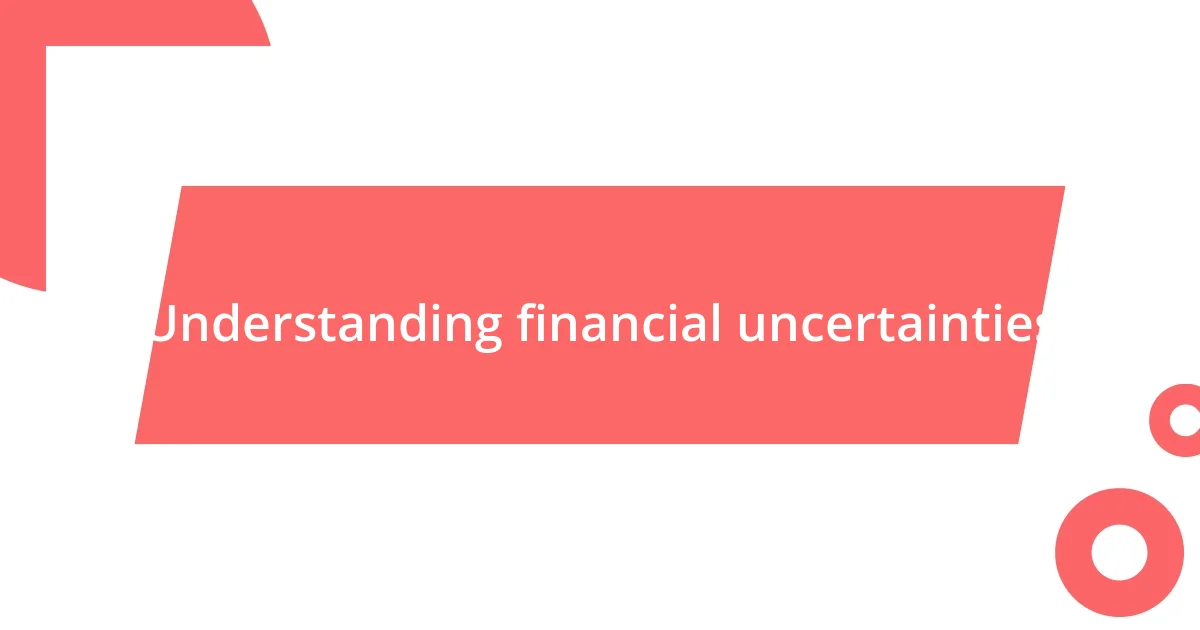
Understanding financial uncertainties
Financial uncertainties can feel overwhelming, like standing at the edge of a foggy cliff, unsure of what lies ahead. I remember a time when unexpected medical bills hit, and suddenly, my well-planned budget felt like it was crumbling. It made me realize that financial instability doesn’t just impact our wallets; it can also shake our emotional well-being.
When I think about financial uncertainty, I often wonder, how do we prepare for something that is inherently unpredictable? For me, it became crucial to create a safety net—not just in terms of savings, but in having reliable information and support. It’s like having a flashlight in that fog; it helps illuminate the path, even when the future seems unclear.
Understanding these uncertainties means acknowledging that they are a part of life. I’ve learned to embrace the unpredictability rather than fight it, which has transformed my relationship with money. After all, isn’t it liberating to know that while we can’t control everything, we can adapt our perspectives and strategies?
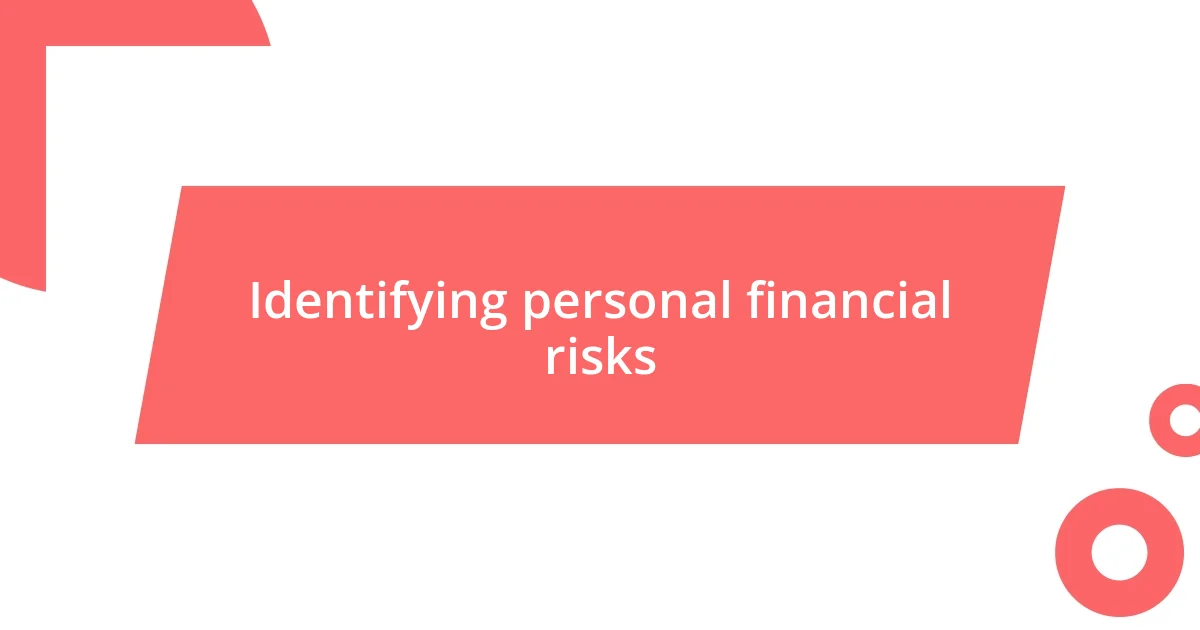
Identifying personal financial risks
Identifying personal financial risks is an essential step in navigating uncertainty. I recall a time when I underestimated the impact of job security on my financial health. A sudden layoff left me scrambling, highlighting how crucial it is to understand the risks that could disrupt our income. This awareness helped me realize that being proactive is far better than being reactive.
To effectively identify these risks, consider these factors:
– Income fluctuations: Is your job stable, or are there seasonal changes in your income?
– Emergency expenses: Do you have a plan for unexpected costs, such as medical bills or car repairs?
– Debt levels: How manageable is your current debt, and what impact could rising interest rates have?
– Market exposure: Are your investments diversified enough to weather downturns?
– Life changes: Have you considered how events like marriage, parenthood, or retirement could affect your finances?
Embracing these insights was transformative for me, as I learned to navigate potential pitfalls proactively rather than reactively. Taking a moment to reflect on possible risks has a way of turning uncertainties into manageable challenges, with the right strategies in place.
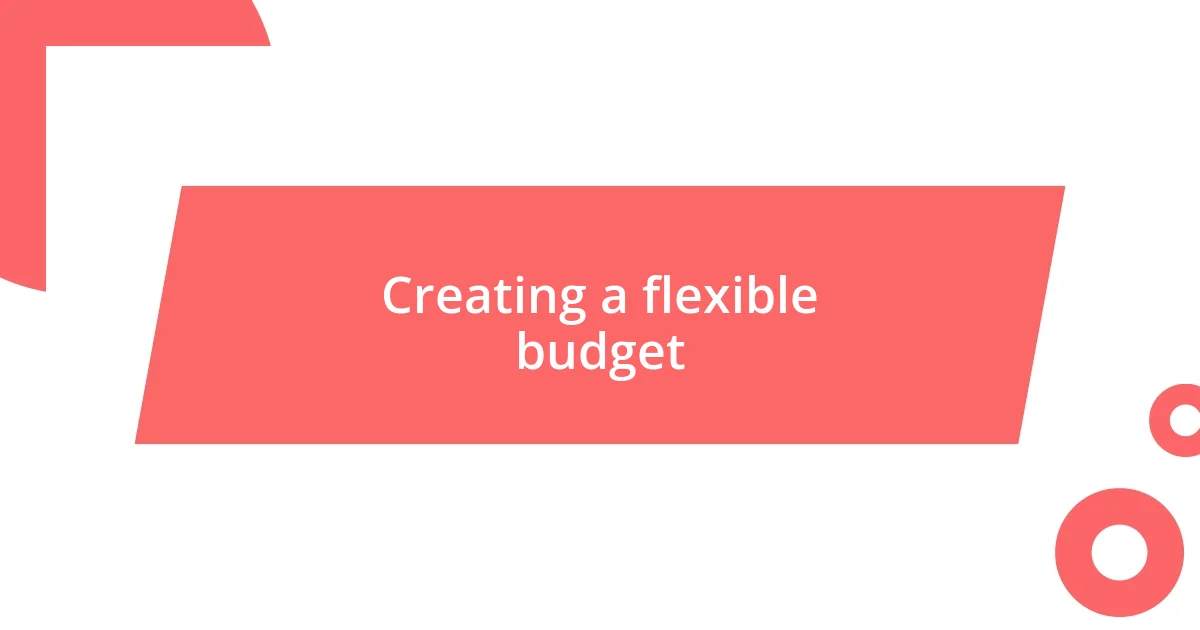
Creating a flexible budget
Creating a flexible budget has been a game-changer in my financial journey. The beauty of a flexible budget lies in its adaptability; it allows for unexpected expenses without derailing your financial goals. I vividly remember a month when my car unexpectedly needed repairs. Instead of panicking, my flexible budget helped me reallocate some discretionary funds to cover the cost without feeling financial strain. It’s all about comfort and security when life’s little surprises land on my doorstep.
One essential tip I have learned is to prioritize needs over wants while still leaving room for the unexpected. For instance, I often set aside a small percentage of my income as a cushion for emergencies. This has not only bolstered my financial stability but also granted me peace of mind. Think of it as building a little fortress for your finances—it keeps you safe during storms and lets you enjoy sunny days worry-free.
In terms of tracking expenses, I’ve found that using digital tools makes life so much easier. Mobile apps can quickly show your spending habits, helping you identify areas where you can cut back if necessary. When I was working on budgeting for a vacation, these tools helped me maximize my savings without sacrificing enjoyment. Just a few tweaks here and there can create a clear path toward financial flexibility, ensuring you can navigate uncertainties with confidence.
| Budgeting Method | Flexibility |
|---|---|
| Traditional Budget | Less flexible; strict categories |
| Flexible Budget | Adapts to changes; reallocates funds easily |
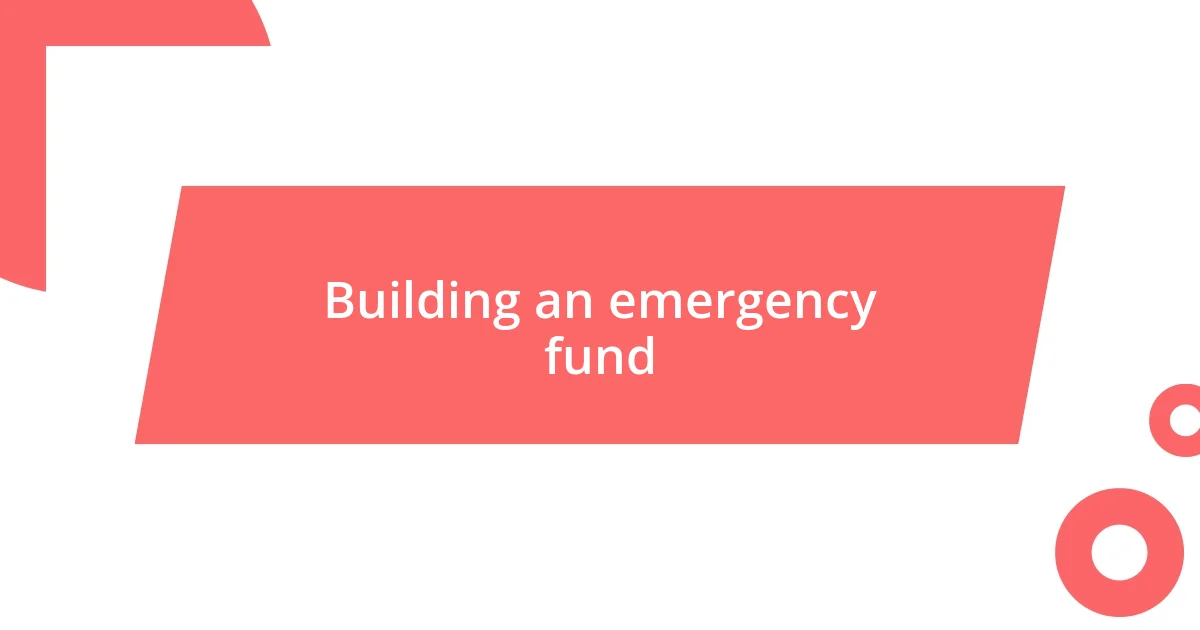
Building an emergency fund
Building an emergency fund has been one of the most significant steps in my financial journey. I still remember that sinking feeling during a sudden medical crisis; having a dedicated savings stash transformed a potentially overwhelming situation into a manageable one. It’s like knowing you have a safety net. Have you ever felt that wave of panic when life throws an unexpected bill your way? Trust me, having that emergency fund can bring a sense of calm amidst the chaos.
I’ve learned that a good rule of thumb is to aim for three to six months’ worth of living expenses. This notion once felt daunting, but breaking it down made it achievable. Start small. I began by setting aside a portion of each paycheck, and over time, those deposits became a significant cushion. Does it feel daunting to start? I assure you, every little bit adds up. Each time I added to my savings, I felt more empowered, reinforcing the belief that I could weather any storm.
One of my favorite tricks is to automate my savings. It’s like setting my financial future on cruise control. When I made the switch, I didn’t even miss the money; it simply felt like part of my budgeting routine. Often, I find that it’s the automatic habit that builds wealth, not just the amount saved. Have you tried this method? It might be the easiest way to build your emergency fund without feeling the pinch in your day-to-day life. Balancing spontaneity and preparation is no small feat, but the peace that comes from being prepared is worth every ounce of effort.
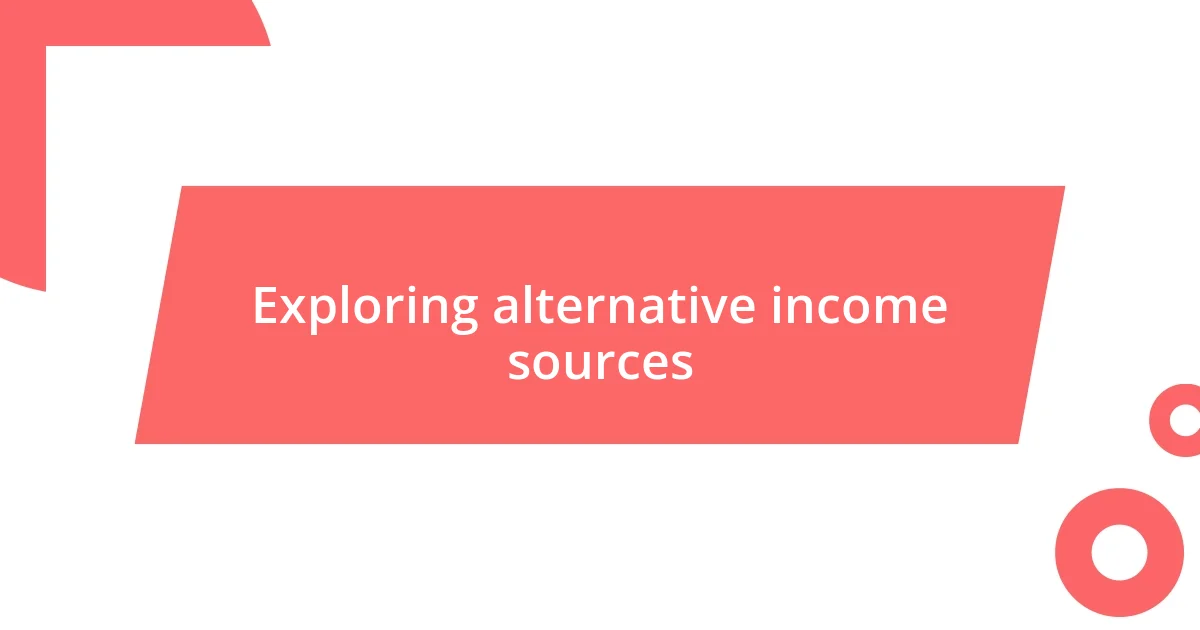
Exploring alternative income sources
Exploring alternative income sources has opened up a whole new dimension in my financial landscape. A few years ago, I dived into freelancing on the side. It wasn’t just about the extra cash; it was exhilarating to leverage my skills to serve different clients and discover new passions along the way. Have you ever thought about what your hobbies could turn into? I found that photography, which I loved as a hobby, quickly morphed into lucrative gigs that added a refreshing layer to my income.
One fascinating avenue I’ve ventured into is rental income. When I rented out a spare room on a popular platform, I was pleasantly surprised by how much it eased my financial worries. That extra revenue not only covered my mortgage but also allowed me to indulge in experiences like travel that I once deemed out of reach. The conversations I’ve had with guests were just icing on the cake! Could something similar work for you? Renting out a room might seem daunting, but once I jumped in, the rewards were well worth it.
I also explored investments in dividend stocks. By taking the time to educate myself about the stock market, I discovered a way to generate passive income. I remember when my first dividend payment arrived—I felt just a tiny bit like a financial genius! Watching those monthly returns grow over time has reinforced my belief in diversifying income streams. Have you ever considered what small steps you could take today to pave the way for future financial security? Building diverse income streams can be a thrilling adventure, turning uncertainty into opportunity.
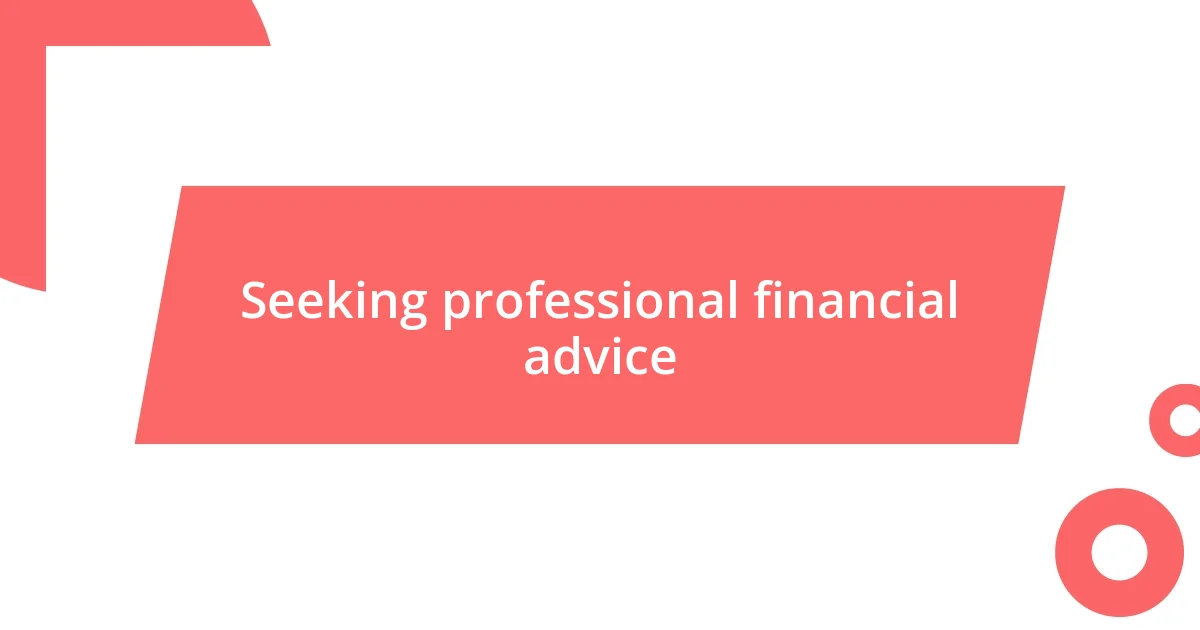
Seeking professional financial advice
Seeking professional financial advice has been a transformative experience for me. I vividly recall my initial meeting with a financial advisor; I walked in feeling lost but left with clarity and direction. It was eye-opening to see how tailored guidance could illuminate options I hadn’t even considered. Have you ever felt overwhelmed by financial choices? I certainly have, and that’s why having an expert in my corner made a world of difference.
During our conversations, my advisor taught me to look at my finances holistically. It wasn’t just about budgeting or investing; it was about crafting a comprehensive strategy that aligned with my life goals. A memorable moment came when we mapped out my financial milestones—suddenly, my dreams felt tangible. I realized that asking for help wasn’t a sign of weakness; rather, it was an essential step towards empowering myself financially. How do you feel about reaching out for assistance? It’s a game-changer, I promise.
Additionally, the peace of mind that came from expert advice has been invaluable. I remember the weight lifting off my shoulders as we developed a roadmap for long-term financial health—all personalized to my situation. I learned that engaging professionals helps prevent costly mistakes, freeing me to focus on what I love. Are you ready to take charge of your financial future? Seeking help can be a pivotal move towards stability, helping you navigate life’s unpredictable twists with confidence.
